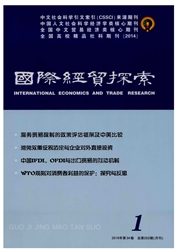

 中文摘要:
中文摘要:
中国对外开放的加深和市场化的发展趋势将逐步使民营企业占据越来越重要的对外直接投资地位,而研究民营企业对外直接投资对东道国的风险偏好态度也是关系其可持续发展的重要因素。文章利用对外直接投资样本充分和行为丰富的温州民营企业进行实证研究,采用东道国的多个经济和政治风险指标发现民营企业在对外直接投资中倾向于经济风险较高的东道国,同时也选择政治风险较低的东道国,说明民营企业在外直接投资中是东道国经济风险的偏好者,但却是政治风险的规避者。进一步地,文章的分位数回归结果发现随着民营企业对东道国对外直接投资规模的差异,对东道国的风险态度和选择也有所不同。
 英文摘要:
英文摘要:
The deepening of China's opening up and the trend of marketization will gradually make private enterprises play a more and more important role in foreign direct investment, and researching the risk preference attitude of host countries has become the important factor for the sustainable development of private enterprises' FDI. This paper makes an empirical study by using the sample of private enterprises in Wenzhou because of their sufficient samples and behaviors and multiple economic and political risk indexes of host countries, and finds that private enterprises tend to choose host countries with higher economic risk and lower political risk in FDI, which means in FDI, private enterprises have a preference attitude for economic risks and an averse attitude for political risks of host countries. Furthermore, the quantile regression results find that the risk attitude of private enterprises for host countries will be different with different investment scale.
 同期刊论文项目
同期刊论文项目
 同项目期刊论文
同项目期刊论文
 期刊信息
期刊信息
